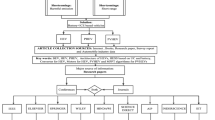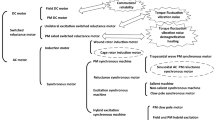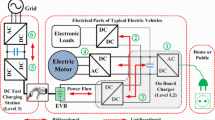Abstract
The advantages of real-time dataset with artificial intelligence-based machine learning algorithms can be utilized for improving energy management in Electric Vehicles (E-Vehicle). Here the machine learning algorithms such as classification, regression, reinforcement, and clustering are incorporated to identify the suitable profile pattern. Electric vehicle modelling can be developed from profile, outline, and formulation for energy efficiency can be done from vehicle state, specifications from acceleration and deceleration with necessary constraints. Each vehicle energy management stages are realized as kinetic energy, mechanical energy, and electrical energy for minimizing the losses within a boundary except proving the constraints. With a problem formulated in each stage for classifying the input profile, it is found that regression analysis matches the energy optimization, reinforcement technique fixes the boundary at every profile input and clustering of data ensures formation of data set. The proposed scheme is validated with MATLAB/Simulink environment and the results shows that the new methods improved the energy efficiency in every stage at the level of 10 to 30%. Also, among the energy efficient techniques, classification and regression schemes adds an error loss of 0.2 to 0.3%, the reinforcement method includes the data handling error of 0.3 to 0.4% and finally, the clustering method increases the error loss in the level of 0.4 to 0.5%.







Similar content being viewed by others
Data Availability
The data that support the findings of this study are available from the corresponding author upon reasonable request.
References
Luin, B., Petelin, S., & Al-Mansour, F. (2019). Microsimulation of electric vehicle energy consumption. Energy, 174, 24–32.
Ziyadi, M., Ozer, H., Kang, S., & Al-Qadi, I. L. (2018). Vehicle energy consumption and an environmental impact calculation model for the transportation infrastructure systems. Journal of cleaner production, 174, 424–436.
Xiong, H., Liu, H., Zhang, R., Yu, L., Zong, Z., Zhang, M., & Li, Z. (2019). An energy matching method for battery electric vehicle and hydrogen fuel cell vehicle based on source energy consumption rate. International Journal of Hydrogen Energy, 44(56), 29733–29742.
Fiori, C., Ahn, K., & Rakha, H. A. (2018). Microscopic series plug-in hybrid electric vehicle energy consumption model: Model development and validation. Transportation Research Part D: Transport and Environment, 63, 175–185.
Wang, J. B., Liu, K., Yamamoto, T., & Morikawa, T. (2017). Improving estimation accuracy for electric vehicle energy consumption considering the effects of ambient temperature. Energy Procedia, 105, 2904–2909.
Benabdelaziz, K., & Maaroufi, M. (2017). Battery dynamic energy model for use in electric vehicle simulation. International Journal of Hydrogen Energy, 42(30), 19496–19503.
Massaguer, E., Massaguer, A., Pujol, T., Comamala, M., Montoro, L., & Gonzalez, J. R. (2019). Fuel economy analysis under a WLTP cycle on a mid-size vehicle equipped with a thermoelectric energy recovery system. Energy, 179, 306–314.
Kaur, R., Schaye, C., Thompson, K., Yee, D. C., Zilz, R., Sreenivas, R. S., & Sowers, R. B. (2021). Machine learning and price-based load scheduling for an optimal IoT control in the smart and frugal home. Energy and AI, 3, 100042.
Merenda, M., Porcaro, C., & Iero, D. (2020). Edge Machine Learning for AI-enabled IoT devices: A review. Sensors, 20(9), 2533.
Anh Khoa, T., Phuc, C. H., Lam, P. D., Nhu, L. M. B., Trong, N. M., Phuong, N. T. H., Van Dung, N., Tan, Y. N., Nguyen, H. N., & Duc, D. N. M. (2020). Waste management system using iot-based machine learning in university. Wireless Communications and Mobile Computing.
Majumdar, S., Subhani, M. M., Roullier, B., Anjum, A., & Zhu, R. (2021). Congestion prediction for smart sustainable cities using IoT and machine learning approaches. Sustainable Cities and Society, 64, 102500.
Adi, E., Anwar, A., Baig, Z., & Zeadally, S. (2020). Machine learning and data analytics for the IoT. Neural Computing and Applications, 32, 16205–16233.
Musardo, C., Rizzoni, G., Guezennec, Y., & Staccia, B. (2005). A-ECMS: An adaptive algorithm for hybrid electric vehicle energy management. European Journal of Control, 11(4–5), 509–524.
Wu, X., Hu, X., Moura, S., Yin, X., & Pickert, V. (2016). Stochastic control of smart home energy management with plug-in electric vehicle battery energy storage and photovoltaic array. Journal of Power Sources, 333, 203–212.
Thounthong, P., Rael, S., & Davat, B. (2009). Energy management of fuel cell/battery/supercapacitor hybrid power source for vehicle applications. Journal of Power Sources, 193(1), 376–385.
Li, Q., Chen, W., Li, Y., Liu, S., & Huang, J. (2012). Energy management strategy for fuel cell/battery/ultracapacitor hybrid vehicle based on fuzzy logic. International Journal of Electrical Power & Energy Systems, 43(1), 514–525.
Dong, H., Zhao, Z., Fu, J., Liu, J., Li, J., Liang, K., & Zhou, Q. (2020). Experiment and simulation investigation on energy management of a gasoline vehicle and hybrid turbocharger optimization based on equivalent consumption minimization strategy. Energy Conversion and Management, 226, 113518.
Guo, H., Wang, X., & Li, L. (2019). State-of-charge-constraint-based energy management strategy of plug-in hybrid electric vehicle with bus route. Energy Conversion and Management, 199, 111972.
Marzougui, H., Kadri, A., Martin, J. P., Amari, M., Pierfederici, S., & Bacha, F. (2019). Implementation of energy management strategy of hybrid power source for electrical vehicle. Energy Conversion and Management, 195, 830–843.
Zhou, Q., Li, J., Shuai, B., Williams, H., He, Y., Li, Z., Xu, H., & Yan, F. (2019). Multi-step reinforcement learning for model-free predictive energy management of an electrified off-highway vehicle. Applied Energy, 255, 113755.
Han, X., He, H., Wu, J., Peng, J., & Li, Y. (2019). Energy management based on reinforcement learning with double deep Q-learning for a hybrid electric tracked vehicle. Applied Energy, 254, 113708.
Hou, J., & Song, Z. (2020). A hierarchical energy management strategy for hybrid energy storage via vehicle-to-cloud connectivity. Applied energy, 257, 113900.
Xu, B., Rathod, D., Zhang, D., Yebi, A., Zhang, X., Li, X., & Filipi, Z. (2020). Parametric study on reinforcement learning optimized energy management strategy for a hybrid electric vehicle. Applied Energy, 259, 114200.
Teng, T., Zhang, X., Dong, H., & Xue, Q. (2020). A comprehensive review of energy management optimization strategies for fuel cell passenger vehicle. International Journal of Hydrogen Energy, 45(39), 20293–20303.
Un-Noor, F., Padmanaban, S., Mihet-Popa, L., Mollah, M. N., & Hossain, E. (2017). A comprehensive study of key electric vehicle (EV) components, technologies, challenges, impacts, and future direction of development. Energies, 10(8), 1217.
Awasthi, A., Venkitusamy, K., Padmanaban, S., Selvamuthukumaran, R., Blaabjerg, F., & Singh, A. K. (2017). Optimal planning of electric vehicle charging station at the distribution system using hybrid optimization algorithm. Energy, 133, 70–78.
Sharmila, B., Srinivasan, K., Devasena, D., Suresh, M., Panchal, H., Ashokkumar, R., Meenakumari, R., Kumar sadasivuni, K., & Shah, R. R. (2021). Modeling and performance analysis of electric vehicle. International Journal of Ambient Energy, 1–14 (just-accepted).
Ravichandran, T., & Nagappan, M. (2019). A novel technique and detailed study of concepts of low-cost hybrid vehicle design. International Journal of Ambient Energy, 1–6.
Patel, M. A., Asad, K., Patel, Z., Tiwari, M., Prajapati, P., Panchal, H., Suresh, M., Sangno, R., & Israr, M. (2021). Design and optimisation of slotted stator tooth switched reluctance motor for torque enhancement for electric vehicle applications. International Journal of Ambient Energy, 1–6.
Sanki, P., Basu, M., Pal, P. S., & Das, D. (2021). Application of a novel PIPDF controller in an improved plug-in electric vehicle integrated power system for AGC operation. International Journal of Ambient Energy, 1–15.
Funding
This research work has not received any funding from any organization.
Author information
Authors and Affiliations
Corresponding author
Ethics declarations
Conflict of interest
The authors declare that there is no conflict of interest.
Additional information
Publisher's Note
Springer Nature remains neutral with regard to jurisdictional claims in published maps and institutional affiliations.
Rights and permissions
About this article
Cite this article
Mathankumar, M., Gunapriya, B., Guru, R.R. et al. AI and ML Powered IoT Applications for Energy Management in Electric Vehicles. Wireless Pers Commun 126, 1223–1239 (2022). https://doi.org/10.1007/s11277-022-09789-6
Accepted:
Published:
Issue Date:
DOI: https://doi.org/10.1007/s11277-022-09789-6




